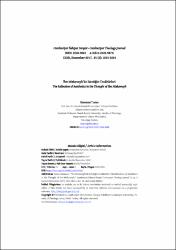| dc.contributor.author | Turan, Ramazan | |
| dc.date.accessioned | 2022-05-11T14:34:32Z | |
| dc.date.available | 2022-05-11T14:34:32Z | |
| dc.date.issued | 2017 | |
| dc.identifier.issn | 2528-9861 | |
| dc.identifier.issn | 2528-987X | |
| dc.identifier.uri | https://app.trdizin.gov.tr/makale/TWpZM016RTRPQT09 | |
| dc.identifier.uri | https://hdl.handle.net/20.500.11776/7949 | |
| dc.description.abstract | XI. yüzyılda yaşamış olan İbn Miskeveyh'in (ö. 421/1030) sistemli olarak estetik ve sanat felsefesinin temel konularını ele aldığı söylenemez. Ancak o, estetik deneyim ve güzellik konusunu bir problem olarak ele alır, estetik deneyimin temel karakterlerini ise birlikle ilişkili görür. Birlik ilâhî olanın özelliğidir, cismanî âlemdeki uyum, oran ve ritimden maksat bu birliğe yaklaşmaktır. Ona göre güzellik nesnel bir kavramdır ve güzel olan, nefs-tabiat-madde üçgeninde belirlenir. Bir şeyi güzel yapan, ilâhî olanı yansıtan nefs ile onu alma yeteneği olan maddenin yeterliliği arasındaki uyumdur. Sanatçı nefse uygun olanı madde üzerine işlediği zaman tamlık ortaya çıkar. Tamlık ise teorik ile pratik arasındaki ilişkinin ürünüdür, iki alan bir birini tamamlar. İbn Miskeveyh eserlerinde, müzik ve şiiri de ele alır, o, müziği ilâhî olanı almaya en yakın deneyim olarak görür. Müzik vasıtasıyla elde edilen deneyim diğer sanatlara oranla nefsi daha fazla etkiler. Ona göre müzik, birlik ve kozmik düzenle irtibatlıdır. Şiire karşı ise mesafelidir, zira onda nefsi tahrik etmek için tertiplenmiş hilelerin kullanıldığına dikkat çeker | en_US |
| dc.description.abstract | It cannot be said that Ibn Miskawayh (d. 421/1030) who lived in the 11th century, systematically addressed the fundamental issues of aesthetics and philosophy of art. But he dealt with aesthetic experience and beauty as a problem. He regards the basic characters of the aesthetic experience as unity. The unity is the nature of the divine and purpose of seeking harmony, proportion and rhythm in the physical world is to approach this unity. According to him, the beauty is an objective concept and the thing that is beautiful is determined in the triangle of soul-nature-matter. What makes something beautiful is the harmony between the soul that reflects the divine and the sufficiency of the substance which has an ability to take it. When the artist processes the appropriate thing for the soul on the matter then the completeness arises. The completeness is the product of the relationship between theory and practice, each of them completes the other. Ibn Miskawayh also analyzes music and poetry in his work, and he thinks that music is the closest experience to reach the divine. The experience which is obtained through music is more influential than any other arts. In his view, music is related to the unity and the cosmic order. He has a prudent approach to poetry because he draws attention to the fact that the poetry uses tricks which irritate direct the soul | en_US |
| dc.language.iso | tur | en_US |
| dc.rights | info:eu-repo/semantics/openAccess | en_US |
| dc.subject | Sanat | en_US |
| dc.subject | Tarih | en_US |
| dc.subject | Müzik | en_US |
| dc.subject | Din Bilimi | en_US |
| dc.title | İbn Miskeveyh'de Estetiğin Tezâhürleri | en_US |
| dc.title.alternative | The Reflection of Aesthetics in the Thought of Ibn Miskawayh | en_US |
| dc.type | article | en_US |
| dc.relation.ispartof | Cumhuriyet İlahiyat Dergisi | en_US |
| dc.department | Fakülteler, İlahiyat Fakültesi, Felsefe ve Din Bilimleri Bölümü | en_US |
| dc.identifier.volume | 21 | en_US |
| dc.identifier.issue | 2 | en_US |
| dc.identifier.startpage | 1013 | en_US |
| dc.identifier.endpage | 1034 | en_US |
| dc.institutionauthor | Turan, Ramazan | |
| dc.identifier.trdizinid | TWpZM016RTRPQT09 | en_US |



















